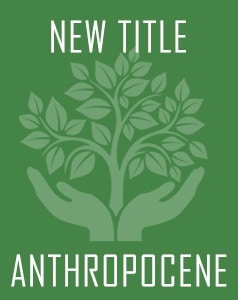
by Mitch Mignano | September 29, 2014 | Releases & Announcements
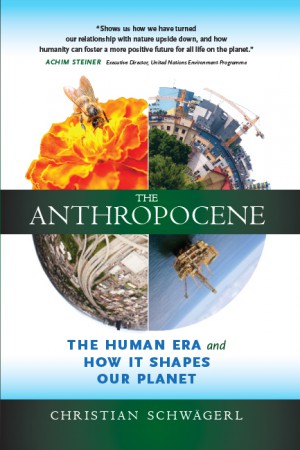 We are pleased to announce the release of our latest title, The Anthropocene: The Human Era and How It Shapes Our Planet by Christian Schwägerl.
We are pleased to announce the release of our latest title, The Anthropocene: The Human Era and How It Shapes Our Planet by Christian Schwägerl.
This thoroughly researched book is the result of 10 years of research by award-winning environmental science journalist and author Christian Schwägerl and offers up a comprehensive world-eye-view of today’s ecological crises.
Christian traveled the globe extensively, visiting rising megacities, along with interviewing key leaders in the fields of science, politics and culture. His work asks us to consider intriguing questions about our global impact as a species and our increasing responsibility as planetary stewards in creating a vibrant, geologically-sustainable future.
Recent Review:
“This is a splendid introduction to the Anthropocene by one of its most eloquent celebrants. I’m especially moved by Schwagerl’s conversations with Paul Crutzen and other scientists at the heart of the Anthropocene debates…. Scholars will appreciate his long tenure with the subject and the depth of his research.”
—Diane Ackerman, author of The Human Age
Learn More About This Title
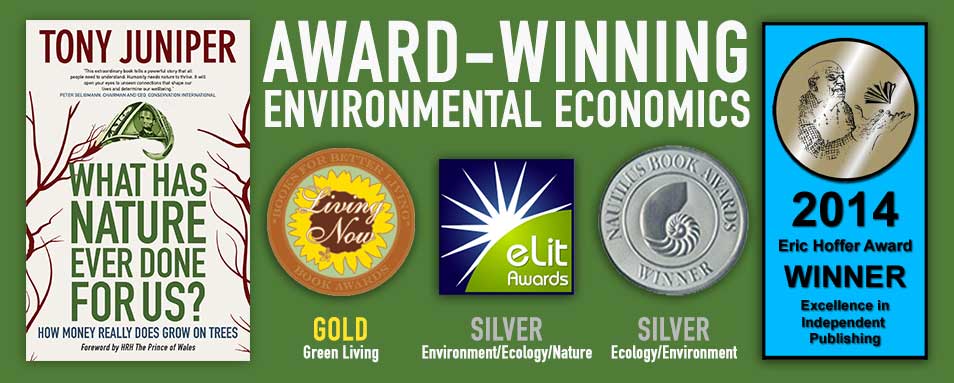
by Mitch Mignano | January 9, 2014 | Uncategorized
Tony Juniper Wins GOLD in Independent Publisher’s Living Now Award for
Best “Green Living” Book
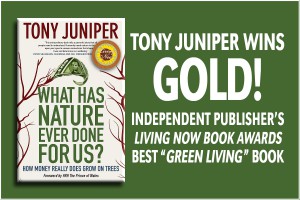
Green Living (Alternative energy, Conservation, Cleaning, etc.)
See full list of winners here
[hr]
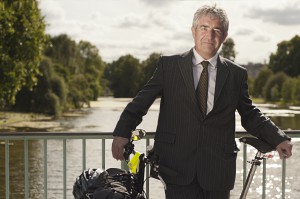 In What Has Nature Ever Done for Us? British environmentalist Tony Juniper points out that we think everything nature does for us — providing water, pollinating plants, generating oxygen, recycling miracles in the soil and much more — is free, but it isn’t. Its economic value can, and has been, measured. And upon realizing what that value truly is we would stop treating our natural systems in a destructive manner. For example, in 2005 Hurricane Katrina cost the US $81 billion and the damage still remains. If the land around the levees hadn’t been redeveloped for shipping and aquaculture, at an estimated value of $100,000 to $450,000 per square mile of natural mangroves, then it is believed, much of the damage caused to the city would not have occurred.
In What Has Nature Ever Done for Us? British environmentalist Tony Juniper points out that we think everything nature does for us — providing water, pollinating plants, generating oxygen, recycling miracles in the soil and much more — is free, but it isn’t. Its economic value can, and has been, measured. And upon realizing what that value truly is we would stop treating our natural systems in a destructive manner. For example, in 2005 Hurricane Katrina cost the US $81 billion and the damage still remains. If the land around the levees hadn’t been redeveloped for shipping and aquaculture, at an estimated value of $100,000 to $450,000 per square mile of natural mangroves, then it is believed, much of the damage caused to the city would not have occurred.
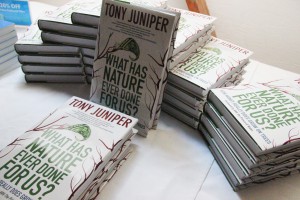 During recent years, environmental debate worldwide has been dominated by climate change, carbon emissions and the greenhouse effect. But a number of academic, technical, political, business and NGO initiatives indicate the emergence of a new wave of environmental attention focused on “natural capital,” “ecosystem services” and “biodiversity,” things nature does for us.
During recent years, environmental debate worldwide has been dominated by climate change, carbon emissions and the greenhouse effect. But a number of academic, technical, political, business and NGO initiatives indicate the emergence of a new wave of environmental attention focused on “natural capital,” “ecosystem services” and “biodiversity,” things nature does for us.
What Has Nature Ever Done for Us? contains impactful stories imparting warnings about this and other unfortunate occurrences such as a rabies epidemic that followed the disappearance of India’s vultures (drugs administered to cattle killed the birds, leaving uneaten carcasses that led to an explosion of wild dogs), as well as promising and enlightening tales of how birds protect fruit harvests, coral reefs shield coasts from storms, and rain forests absorb billions of tons of carbon released from automobiles and power stations. As a result of its immediacy, Tony Juniper’s book will entirely change the way you think about life, the planet and the economy.

by Mitch Mignano | October 11, 2013 | Uncategorized

Synergetic Press is currently offering FREE eBooks. If you have read or would like to read any of the following three titles and would like to post a review on Amazon and Google Play, we will give you one FREE eBook!
Eligible Titles: Click on any of the titles below to submit a review.
Interested? Email Us!
We will send you a coupon code for a free ebook. When you are finished reading the book, submit a review and send us a link. It’s that easy!
We encourage honest reviews of our titles.
This offer is good until December 31, 2013 so get your review in now!
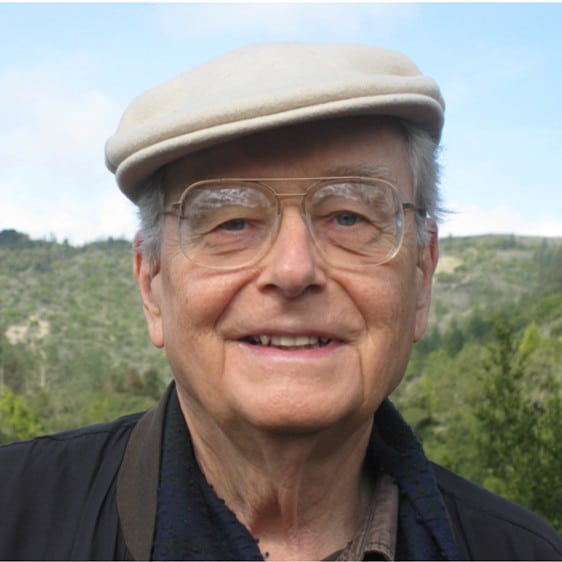
by Mitch Mignano | September 23, 2013 | Uncategorized
[divider]
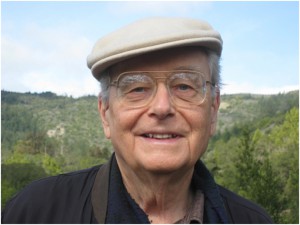
pioneer in psychedelics and consciousness research, shares stories of his extraordinary experiences and reflects on the life of the most famous chemist of the twentieth century, Albert Hofmann, to commemorate publication of Mystic Chemist: The Life of Albert Hofmann and His Discovery of LSD; and Ralph’s latest book, Worlds Within and Worlds Beyond
Ralph Metzner, PhD, part of the famed triad of psychologists who became world famous as pioneers of psychedelics in the 1960s, continues to practice psychotherapy and to teach workshops nationally and internationally. He coauthored with Ram Dass Birth of a Psychedelic Culture: Conversations about Leary,the Harvard Experiments, Millbrook and the Sixties in 2010 chronicling the origins of modern psychedelic culture.
Editor of the Psychedelic Review and The Ecstatic Adventure,he wrote Maps of Consciousness, Know Your Type, The Unfolding Self (1986), The Well of Remembrance (1994),and Green Psychology (1999). He served as Academic Dean at the California Institute of Integral Studies during the 1980s, where he is now Professor Emeritus. Metzner is founder and president of the Green Earth Foundation, a non-profit educational foundation. Most recently, he completed writing and publishing a new series of seven short books, with the general title “The Ecology of Consciousness.”
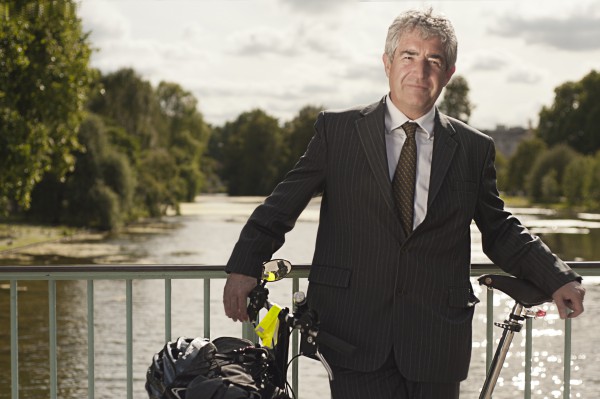
by Mitch Mignano | September 9, 2013 | Uncategorized
The Orbit of Tony Juniper

The passionate environmentalist talks about his new book and his desire to educate others about a healthy planet and a healthy life.
During recent years, environmental debate worldwide has been dominated by climate change, carbon emissions and the greenhouse effect. But a number of academic, technical, political, business and NGO initiatives indicate the emergence of a new wave of environmental attention focused on “natural capital,” “ecosystem services” and “biodiversity,” things nature does for us. As a leading environmentalist and special adviser to the Prince of Wales’ International Sustainability Unit, Tony Juniper has a unique and learned perspective, having studied, advised, and campaigned for environmental issues over the last 30 years
In his book, What Has Nature Ever Done for Us? Juniper points out: “As a species we think that everything nature does for us — providing water, pollinating plants, generating oxygen, recycling miracles in the soil and much more — is free, but it isn’t. Its economic value can, and has been, measured. And upon realizing what that value truly is, we would stop treating our natural systems in a destructive manner. For example, in 2005 Hurricane Katrina cost the US $81 billion and the damage still remains. If the land around the levees hadn’t been redeveloped for shipping and aquaculture, at an estimated value of $100,000 to $450,000 per square mile of natural mangroves, then, it is believed, much of the damage caused to the city would not have occurred.” “Nature gives us everything, and it gives us life. The destruction of nature will ultimately lead to our own destruction. We are ignoring the very thing that is truly our life support system. When nature suffers, we do too because without nature we have no life,” he adds.
When nature suffers, we do too because without nature we have no life.
A sobering but realistic viewpoint. When asked what the book was about, during our phone conversation, Juniper explains: “What this book is all about is an explanation of what nature does for us, why it is so important, and what we can do to ensure nature keeps on doing it.” He continues, “Unfortunately most of the people reading scientific reports about the environment are scientists. The task of conveying this information to a bigger number of people is my most important job. For instance, I prefer to use the word ‘nature’ over the word ‘environment’ because people relate to it better. Unfortunately, most people don’t realize what nature really does for us.” He further outlines the points made in What Has Nature Ever Done For Us? About natural resources: “When we speak about natural resources, they often become things that we take for granted. Our fresh water, healthy soil, air quality, pollinating insects, climate stability, and so many more essential services are all things that exist in nature but have true economic value. Natural resources are not just a set of raw materials we are provided with for free, but things we need to maintain and protect. The word ‘nature’ in itself has an implication about our true relationship with the rest of creation.” Our air quality, quality of our water supplies, even our soil is suffering. We as human beings are sicker than ever before. Many people are on a cocktail of medications to treat everything from anxiety to cancer. What medical professionals say: “In my meetings recently with medical professionals, their findings are: “research indicates that In the treatment of psychological conditions such as stress, the idea of taking time in nature has been found to be an even better treatment than mainstream drug treatments.” On how to ‘view’ natural resources: “The leap of insight that the book is trying to communicate is that we need to see our natural resources as valuable, and that we are ultimately in the same lifeboat as nature.” As Prince Charles points out in the book’s forward: “The services and countless benefits to the human economy that come from Nature have an estimated value every year of around double the global Gross Domestic Product, and yet this colossal contribution to human wellbeing is hardly ever mentioned when countries consider how to create future growth.” Juniper offers a profound example of such a cost: A story about vultures and their relationship to the health and wellbeing of human beings in India. “Anti-inflammatory drugs administered to cattle and buffalo in India ended up costing the country 63 billion dollars. How? By poisoning and killing the vultures that clean up the dead carcasses of these creatures. It is estimated that 40 million vultures were responsible for cleaning up 1.2 million tonnes of flesh each year. The death of these very important vultures thereby created a chain reaction that led to an explosion in the population of the country’s wild dogs who now had more food. More dogs led to more dog bites, creating rabies infections in people. Not only did rabies kill tens of thousands of people, it cost the country billions of dollars.” How do our children experience nature today? Do they spend their time connected to …iPads, televisions, or computers? Or does their education in life and in school involve experiencing nature first hand? If our children don’t learn about and experience nature, they will understand it even less than our political leaders do today. Help them understand its worth. Because, as Juniper points out, “It’s a simple truth that nature is good for you.” Nature is balanced. We need to be, too.
Download PDF

 We are pleased to announce the release of our latest title, The Anthropocene: The Human Era and How It Shapes Our Planet by Christian Schwägerl.
We are pleased to announce the release of our latest title, The Anthropocene: The Human Era and How It Shapes Our Planet by Christian Schwägerl.







